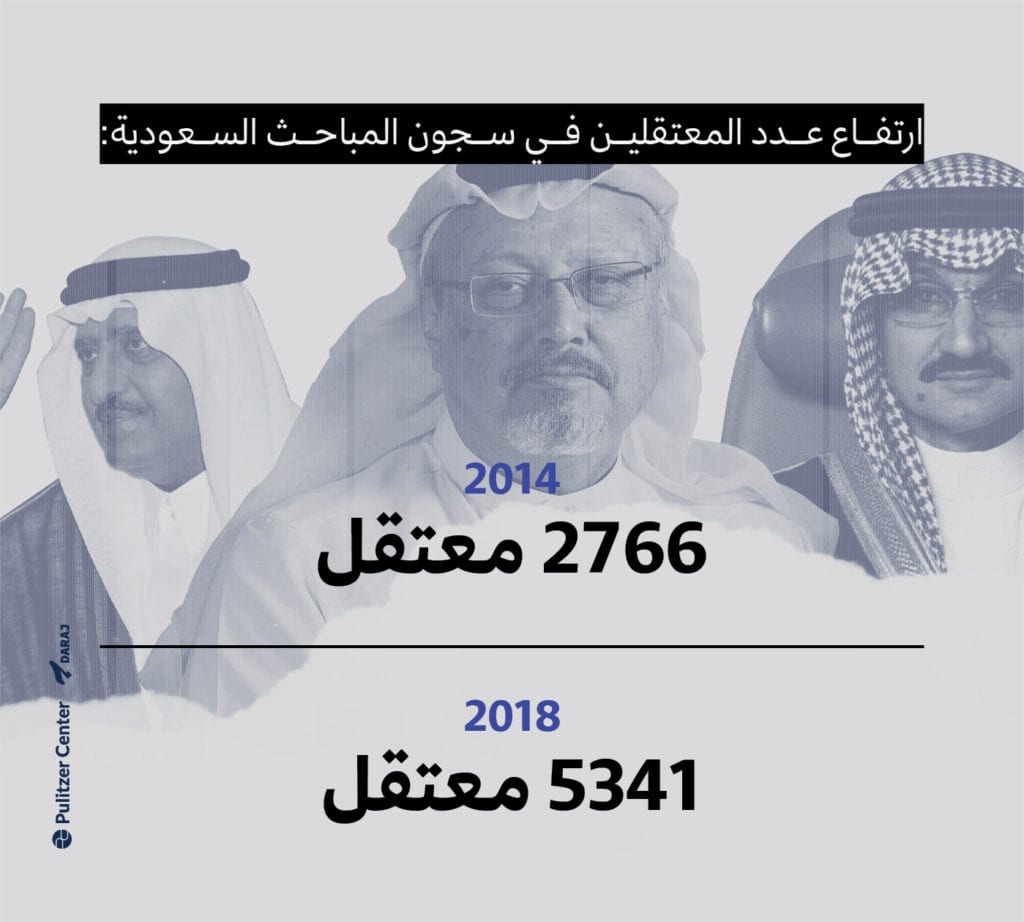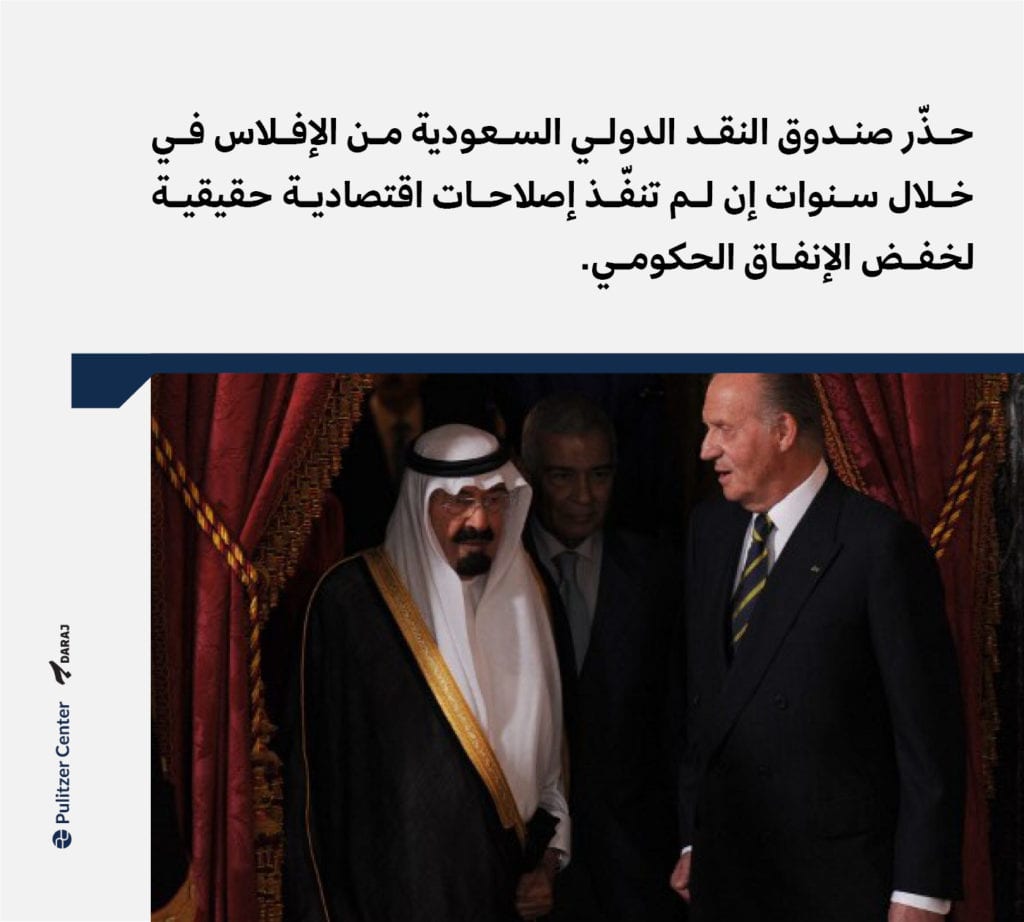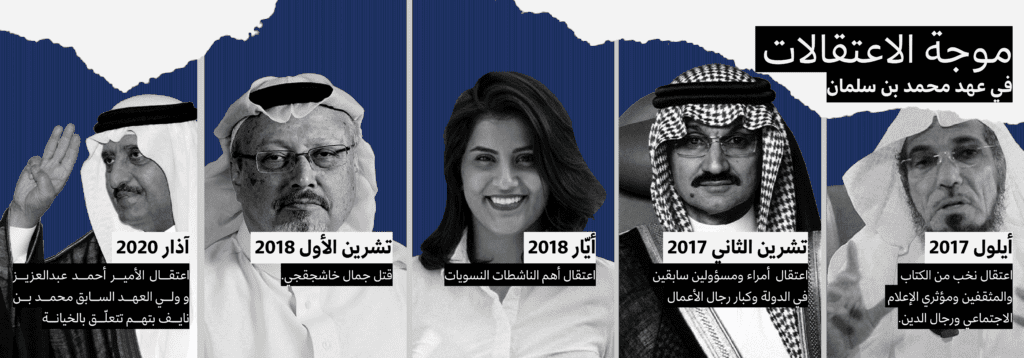This topic has been prepared in cooperation with Pulitzer Center.
The death of the well-known Saudi columnist Saleh al-Shehi due to his infection with COVID-19 has stirred widespread concerns over the fate of thousands of detainees in the Saudi ’Mabahith Prisons. Al-Shehi was detained in early 2018 after he accused the Royal Court of corruption. Some reports indicated that his health situation had deteriorated lately after his detention until he died after contracting COVID-19 within weeks after he was released. His unexpected death triggered many families of the detainees to demand that the officials disclose the fate of their relatives in fear of the repetition of the same scenario where the infected detainees will be released shortly before they die so the authorities won’t be held accountable. Those concerns reflected confidence slumped to low records as a result of the protracted approach of violations practiced through the arrests, enforced disappearances, torture, and even murders at the hands of officials of the national security. Also, COVID-19 provided the officials with a new pretext to hide the detainees and the details about their detention and to stir additional widespread concerns about how the state manages the protection measures in prisons in general and the political prisons in particular.
The Shift to The Police State Approach
The noticeable surge in the severity of the political crackdown and the expansion of its circles since the prince Mohammad bin Salman became the Crown Prince reflect the changes in the traditional social control tools that mostly depended on the religious incitement and the hidden security harassments or the prevention of privileges and positions. Although Saudi Arabia has never been one of the states that allow the circulation of political powers as widely recognized, the re-concentration of power in the hands of the Royal Court and the Crown Prince Mohammad bin Salman marks a worsening phase of the absolute totalitarian regime. Creating alliances between the founding king and the tribes, nobles, and the religious leaders had been an essential factor in the beginnings of the nascent state that aimed at the domination of monarchy and the consolidation of its legitimacy.

At that time, the oil revenues with the monarchy had full control over spending and distributing it contributed to guarantee the loyalty of the military, economic, cultural elites to the ruling regime, and that they depended on its survival. The oil revenues also provided the monarchy with a pretext to support its regional interests through security and economic alliances with the neighboring countries. The United States supported the Gulf monarchies in general – the Saudi Arabian monarchy in particular- through all the existential crises based on a policy that prefers the gradual reform over the revolutionary change of the ruling regimes.
Saudi Arabia also went through some reform junctures that provided ample space for public demands of reform as happened in the period after the September 11 attacks and during the Arab Spring revolutions. However, the oil revenues always helped in putting a spoke in the wheel of the revolutions before it arrived in the Gulf and chased the “backfired revolutions” as described by the Saudi media recently. Saudi Arabia internally pumped money generously and approved some formal reforms. The loyal regimes were also saved, as happened with the ruling regime in Bahrain at the hands of the regionally and internationally supported Peninsula Shield Force.


However, oil revenues–which funded the survival of the absolute power of monarchy- have been subjected to decline and volatility since 2014. Which prompted the International Monetary Fund to warn Saudi Arabia of bankruptcy within a couple of years, had not the kingdom implemented real economic reforms to cut government spending. The economic threat made a clear way for the emergence of a new approach to control the society, recirculate the absolute power of the royal family, and form internal and external alliances. The 2030 vision was launched, and it evolved around diversifying the economy and social openness without any different political concepts. The Crown Prince Mohammad bin Salman intensely appeared in the media as the sponsor of the vision and a new promising face in the kingdom world.
The launch of the 2030 vision was accompanied by several media coverage to highlight the new face of the kingdom who focuses on the youth and unleash their energies. In addition to hinting to the end of the traditional alliance between the royalty and the religion in Saudi Arabia. The end of the domination and power of the religious leaders and keeping them out of the control of the society was the most crucial factor of the promotion for the Crown Prince and his vision. Not only youth but also the supervisors and allies abroad are complicated loathing restrictions over the general and individual life.
Saudi Arabia always portrayed as the country that supports and exports the religious reactionary and that resists any manifestations of modernization. Maybe this contributed to the initial increase of the Crown Prince’s popularity among the youth and the international observers. To the extent that made Thomas Friedman, one of the fiercest former critics of the Saudi regime, describe him as “The one who will bring the Arab Spring to Saudi Arabia” after a meeting with the Crown Prince in November 2017…
This acquired reputation did not last so long. It quickly collapsed domestically and abroad despite hiring the best publicity and consulting companies. The alliances in the region reshuffled into a new axis that includes Saudi Arabia, the United Arab Emirates, Egypt, and Bahrain. The efforts of this axis focused on the resistance of the revolutionary shift and the re-establishment of the absolute power of monarchies. The need for social control separated from the religious frame contributed to the use of electronic surveillance of the public through social media, which is mostly used by the Saudis. This enabled the shift to the police state using very highly developed Israeli equipment to spy and stalk the critics covered by combatting terrorism. This contributed to the prevalence of organized waves of political detentions against the influential elites from all sectors based on general accusations coated by patriotism.
The first campaign that took place in September 2017, without worth mentioning international resonance, targeted elites of writers, intellectuals, influencers of the social media, and religious leaders, most notably of which Salman al-Ouda, who is followed by millions inside and outside Saudi Arabia. Those who support the authority justified the detentions as a necessity to provide a space for the social openness measurements according to the 2030 vision. However, the most notable detainees supported the declared vision. This campaign was followed by the most notorious wave of the political and economic elites detention in the Carlton Ritz in November 2017 on the pretext of combating corruption. Arrests included princes from previous ruling families, former state officials, and significant business people. The state created a private company to manage the money obtained from the detainees under the supervision of the Saudi Crown Prince. The confiscation of funds was not subject to any measurements that guarantee the transparency and fairness of the process or the protection of the detainees. Then, the most prominent female feminists were detained in May 2018, weeks before women were allowed to drive. Their detention synchronized with an unprecedented campaign of media defamation under allegations of treason against the nation and cooperating with foreign countries.
However, the most circulated, influential, and embarrassing event was the killing of the famous writer Jamal Khashoggi in the Saudi consulate in Istanbul by a hit-squad close to the Crown Prince, on the background of his publication a series of articles in the Washington Post in which he criticized the policies of the Crown Prince. Due to the terrifying details of his death that were leaked through Turkish recordings, the Saudi authority had to admit his murder after several attempts to deny its responsibility. The Saudi approach has taken crackdown on dissidents to a whole new level, through a range of practices that include forcibly returning opponents to the Kingdom, illegal spying on activists, officials and businessmen inside and outside the Kingdom, using mainstream media to broadcast incitement campaigns and rumors, and criminalizing all forms of peaceful demands, which were supported by an amended version of the anti-terrorism law issued in 2017. Pursuant to this amended version of the law, criticizing the Crown Prince or the King has become a terrorist crime. This new oppressive approach was aimed at strengthening the power of the Crown Prince through all organs of the State and imposing the authority’s narrative within the public discourse in the country, by silencing opponents and rival platforms like Al Jazeera news channel, which closure was one of the key requirements to end the Gulf blockade of Qatar..
Nevertheless, the Kingdom of Saudi Arabia has failed to meet its obligations stipulated by the National Transformation Program 2020, which was based on the Saudi Vision 2030. This failure was mainly due to political miscalculation, the inability to gain local and international trust, the costly outcomes of financing the Yemen war, wrongful forecasts of major projects like Aramco’s initial public offering for foreign investors, planning the“Neom” project, the city of the future, in addition to boycotting Qatar and the recent escalation against Iran. This escalation led to several attacks against key oil facilities in one night and the loss of half of the Saudi oil production. Moreover, this failure was also the outcome of several criminal practices of senior officials, most notably the detention and torture of businessmen and elite figures in the society in the Ritz Carlton hotel, and the brutal murder of the Journalist Jamal Khashoggi. After failing to achieve economic diversification and attracting investments, the Saudi state resorted to political targeting of dissidents as an alternative option to control the society and impose its narrative.
In 2020, the number of prisoners in Saudi Mabahith prisons increased, reaching unprecedented rates. The statistics of an official website of information on detainees in the Mabahith prisons showed an increase in the number of detainees to 5,341 prisoners in 2018 compared to around 2,766 detainees in 2014. And even though the laws forbid the detention of any person for more than six months without a trial, over 3,380 people have been incarcerated for periods exceeding six months without trials and their majority have spent over a year in detention.
In 2020, the economy has deteriorated as a result of flooding the market with Saudi oil -which is the key source of income in the Kingdom- following a dispute with oil producers in Russia. The second quarter of the year 2020 recorded the lowest income levels, equivalent to 77% of the annual revenue shortfall. Furthermore, the coronavirus (COVID-19) pandemic added more pressure on the economic diversification target sectors, such as tourism and entertainment. Thenceforth, the State applied an additional set of austerity measures, including suspending the cost of living allowance for public sector workers, applying an unprecedented Value Added Tax, VAT, amounting to 15%, which contradicts with the Saudi Vision 2030 pledges, increasing customs duty rates in addition to previous decisions relating to cutting energy subsidies and cutting overall government spending.


Further Concerns from the Deterioration of the Health of Detainees
The figures of the Saudi Ministry of Health show that the country recorded the highest rates of infection with the coronavirus in July 2020. In August, the country recorded the highest rates of infection in the Middle East after Iran, despite the difference in the population count. Since the beginning of the crisis, the State has set a number of unprecedented precautionary measures, most notably imposing a nationwide partial curfew or a total curfew at times, suspending schools and universities and implementing a remote learning system, the declaration of an alert status in hospitals and giving coronavirus patients the priority, suspending prayers in mosques and public events and applying strict fines on people who violate these measures, restricting the Hajj season to limited numbers of pilgrims, and cancelling international flights after a preliminary period of testing all inbound passengers and quarantining them. Subsequently, the State announced a set of procedures that include housing some migrant workers in schools and hotels, as they have highest rates of coronavirus infections due to their low living conditions, transportation, and laying them off without providing them with sufficient compensations which makes them unable to take the necessary prevention measures.
During the coronavirus pandemic, the prison’s administration announced a set of different precautionary measures in cooperation with the Ministry of Health in the implementation of preventive procedures, including holding awareness lectures, testing workers before entering wards and instructing them to use personal protective gear, and suspending all family visits, cultural and sports activities. The General Directorate of Prisons declared that there are no coronavirus infections among Saudi prisons inmates, and that family visits were replaced by e-services. However, it further noted that visual communication between inmates and their families are being considered, but that was not implemented until present according to sources from detainees’ families.
Thus, the pandemic has justified the State’s implementation of further isolation measures on the Mabahith detainees and the non disclosure of their health and legal situations in the absence of any communication with their families. The Saudi authorities usually detain political prisoners for a period of investigation at the Presidency of State Security averaging from two to four months, while being completely deprived of any visits or legal representation during this period. Some detainees may be allowed to make brief calls to their families that would not exceed a few minutes intermittently, so they would not talk about their detention details, reasons and torture.
Therefore, all of this leads to legitimate concerns about the fate of detainees in Saudi prisons, especially amid the suspension of visits and trials due to the pandemic.
There was no adequate justification for the decision of suspension of trials since the State has established an e-trial system since December 2019, that was implemented in the Criminal Courts in Riyadh, Mecca, Jeddah, Jizan and Dammam, which are the cities that contain the highest numbers of detainees in Mabahith prisons. There were concerns not only about their detention for indefinite periods but also about the possibility of the deterioration of their psychological and physical conditions, in light of reports suggesting they were brutally tortured during investigations, which exposes their health to further deterioration amid restrictions on healthcare and visits. Following the murder of Khashoggi, foreign press published several reports about the torture of some of the Ritz Carlton detainees in similar methods to those carried out by American investigators against Al Qaeda bombings suspects, as Saudi detainees are transferred to secret places of detention that have torture rooms using internationally prohibited torture methods. The use of these torture methods was raised for the first time when American investigators have used them against the September attacks suspects, and have caused a widespread wave of resentment by international investigators and experts given their brutality and uselessness. Furthermore, several international newspapers have published testimonies of credible sources suggesting that the Ritz Carlton detainees were being tortured by beating, suspension and electrical shocks, as the detained Major General Ali Al Qahtani, the chief of staff of the former Prince of Riyadh, has been tortured to death. This raises several questions about international cooperation relating to training Saudi state security officers on these internationally prohibited torture techniques that may have serious health implications and may lead to death, particularly in light of the documented systematic violations during investigation processes.
Consequently, other detainees’ families were panic-stricken as news spread that some prisoners had been tortured with the same methods by the authorities, including human rights female activists. Notably, the demands that spread on social media inquiring about the fates of Loujain al-Hathloul by her relatives, with Loujain being one of the most prominent activists, detained on the charges of her demands to end the movement restrictions and the male guardianship over women in the kingdom, along with Dr. Salman al-Odah, the Islamic preacher, as well as the enlightened Islamic researcher Hassan Farhan al-Maliki.
On the other hand, the Guardian dropped a bombshell in its report published in March 2019, on leaks from the royal court denoting the horrific torture of the political prisoners. The report stated that a doctor was directed by the royal court to conduct a quick examination of nearly 200 male and female detainees held in Mabahith prisons even though the Crown Prince’s advisers opposed that. Although the Guardian did not publish all the reports, yet it published some of the names and shocking medical notes on each prisoner, in which the numerous injuries and bruises in different parts of the body, malnutrition, and in some cases, the inability to move, indicated gross medical negligence.
This triggered all human rights organizations and those concerned with the public interest to submit a request to the authorities demanding the release of the Mabahith Prison detainees to reduce the chances of being infected. The authorities responded by releasing a limited number of the public-right (ordinary) prisoners and foreign detainees who violated residency laws, and they were sent back to their home countries. In early April 2020, Dr. Abdullah al-Hamid, one of the most prominent advocates for the transition to a constitutional monarchy, fell in his cell as he suffered from a stroke. This was mainly due to delaying the heart surgery scheduled three months earlier. He went into a coma for four hours before being hospitalized where his death was announced. Also, Dr. Abdulaziz al-Dakhil the former undersecretary of the Ministry of the Economy, and Akl al-Bahli, both of whom are prominent advocates of political and human rights reform were arrested on the charge of publishing condolence in al-Hamid’s death. The lawyers of Princess Basmah bint Saud, who has been detained with her daughter since early 2018, in Al-Ha’ir political prison in Riyadh, have tweeted appealing to the King and his Crown Prince to release her due to her deteriorated health conditions as she was ill before the detention. The state officials denied the torture allegation of the female detained activists families, without conducting any investigation or allowing independent UN rapporteurs to attend the investigation, hear the court sessions, or give them access to the public prosecutor’s evidence.
Toward More Violence and Physical Liquidations
During the COVID-19 pandemic and economic pressures, the kingdom no longer attaches weight to the white elephant project as in the future city of Neom. But rather resorted to the detention and physical liquidation when challenged by some twenty thousand inhabitants who resisted the coercive evacuation attempts, and killed Abdulaziz al-Hwaitat in his house during the alleged exchange of fire with the Saudi Security forces. Abdulaziz posted several videos online, in which he declared his refusal to be evacuated from his house or receiving any compensatory damages. Later, news spread that some of the al-Hwaitat tribe men are detained in the notorious Mabahith prisons for several months now for refusing to be evacuated or receive compensatory damages.
The last straw was the arrest of both Prince Ahmed Abdulaziz and the former Crown Prince Muhammad bin Nayef on charges of treason in March 2020. Prince Ahmed Abdulaziz was one of the elites of the ruling family as one of the three still alive sons of the founding monarch king and one of the members of the Allegiance Council entitled to appoint the King and the Crown Prince. Prince Ahmed appeared in a video that went viral taken by some demonstrators in London, urging them not to call for the downfall of the House of Saud and reminding them that the Yemen war was the decision of the King and the Crown Prince. Shortly after the killing of Jamal Khashoggi, Prince Ahmed returned to Saudi Arabia and since then he had no public or political role until he was arrested. As for Muhammad bin Nayef, he appeared in the state television declaring that he abdicated his role to the throne to Prince Mohammed bin Salman, after being detained and threatened for a whole night in the summer of 2017. The Prince was under house arrest and his allocations were confiscated until the time of his arrest. Furthermore, the General Directorate of Prisons deleted a tweet posted in May 2020 declaring that Prince Muhammad bin Nayef was transferred to intensive care after suffering a heart attack. Subsequently, the news raised concerns about the wellbeing of the Prince which prompted the largest bloc in the European Union (the European People’s Party) to submit a request to the Saudi authorities demanding they ensure the wellbeing of the Prince and to make his detention place known.
A Gloomy Outlook
Saudi Arabia has shifted from building internal alliances and non-alignment approach to policies of oppression and hegemony both domestically and abroad. And up till now, there are no indicators of changing the methodology of governance regarding political openness, neither the pressures that King Salman and the Crown Prince faced in the five-year-long military intervention in Yemen has provided any indications to back down. The boycott of Qatar still exists despite the security and economic considerations of the boycotting countries. Furthermore, the political detention file with its excessive brutality and expansion in the past few years was a heavy burden that mired not only the legitimacy of the Saudi regime but also its international allies, with the United States of America topping the list. Despite the revolutions scenario being unpredictable in a country like Saudi Arabia that has dried up the civic and political activities over the last decades, the stage is set for other gloomy scenarios that could take place. One of which is the rise in the popularity of extremist currents such as religious ones as an alternative to containing the public rage from the detention of religious symbols as previously happened in Iraq, Syria, Yemen, Egypt, and Libya under civil regimes that paved the way to despotic practices. It may also leave the door wide open to the organizations outside the bounds and the framework of the state under the auspices and hegemony of regional regimes seeking to expand their influence and exploit the feelings of public anger and exclusion. For every political prisoner, there are a family, friends, an entire group of people who are marginalized and subdued by force. This gloomy outlook does not leave a good chance to build the popularity of any emergent leadership or its allies. Especially in a region where regional and international parties are fighting against each other, and the fate of any political leadership is determined by taking advantage of the opportunity. The Arab Development Report published at the beginning of the millennium still strikes a chord with what is happening today, in its reference to the impact of restricting political freedoms on the failure of Arab development efforts. Unfortunately, nothing would make up for the protracted effort to quash civil and cultural elites through political detention…






